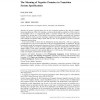Free Online Productivity Tools
i2Speak
i2Symbol
i2OCR
iTex2Img
iWeb2Print
iWeb2Shot
i2Type
iPdf2Split
iPdf2Merge
i2Bopomofo
i2Arabic
i2Style
i2Image
i2PDF
iLatex2Rtf
Sci2ools
110
click to vote
LPNMR
1990
Springer
1990
Springer
The meaning of Negative Premises in Transition System Specifications
We present a general theory for the use of negative premises in the rules of Transition System Specifications (TSSs). We formulate a criterion that should be satisfied by a TSS in order to be meaningful, that is, to unequivocally define a transition relation. We also provide powerful techniques for proving that a TSS satisfies this criterion, meanwhile constructing this transition relation. Both the criterion and the techniques originate from logic programming [van Gelder et al. 1988; Gelfond and Lifschitz 1988] to which TSSs are close. In an appendix we provide an extensive comparison between them. As in Groote [1993], we show that the bisimulation relation induced by a TSS is a congruence, provided that it is in ntyft/ntyxt-format and can be proved meaningful using our techniques. We also considerably extend the conservativity theorems of Groote [1993] and Groote and Vaandrager [1992]. ning example, we study the combined addition of priorities and abstraction to Basic Process Algebra...
Related Content
| Added | 11 Aug 2010 |
| Updated | 11 Aug 2010 |
| Type | Conference |
| Year | 1990 |
| Where | LPNMR |
| Authors | Roland N. Bol, Jan Friso Groote |
Comments (0)

